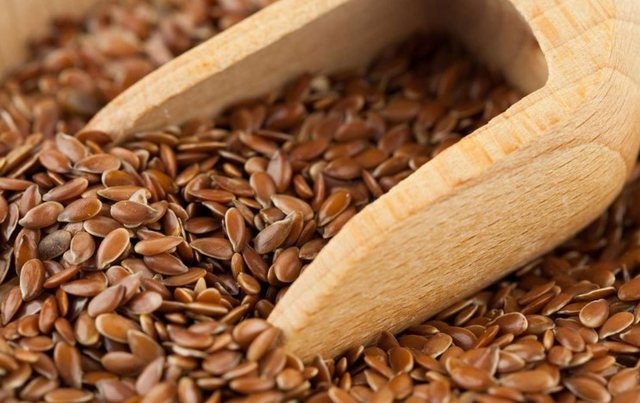
 Flash News
Flash News
Video/ Revolt in Corfu prison, Albanians and Georgians set fire to cells
Accident at "Shkalla e Tujanit" in Tirana, a car overturns after the collision
KPA dismisses Tirana judge Ardiana Bera from office
Don't lose face/ After Rama's 'threat', SP candidates withdraw request from CEC
VIDEO/ The assassination in Durrës, the moment of the murder of 29-year-old Ermir Dedja
Flax seeds, positive and negative effects of their consumption

They may be small, but these seeds have a powerful impact on your health.
AgroWeb.org introduces you to the many ways that adding flax seeds to your recipes can bring health benefits, as well as some tips to consider before using them.
Rich in fiber
One tablespoon of flax seeds has almost 3 grams of fiber, which is equal to 11% of the recommended daily value.
According to health experts, you should get an average of 25 to 30 grams of fiber per day.
A low-fiber diet not only affects your weight loss efforts, but can also cause digestive problems and even increase the risk of developing chronic diseases.
Adding seeds to your breakfast is the best way to start incorporating them into your diet.
They are a rich source of omega-3 fatty acids.
Specifically, flax seeds are rich in alpha-linolenic acid (ALA), a type of essential fatty acid that your body can't produce. The only way to get it is through food, and flax seeds are perfect.
In general, consuming omega-3 fatty acids has been shown to reduce inflammation in the body, which may help prevent the development of chronic diseases.
May improve heart health
These seeds, rich in omega-3 fatty acids and with anti-inflammatory properties, can help reduce the risk of heart disease.
They can also effectively lower blood pressure, which is important for preventing heart attack and stroke.
They can help with digestion.
Flax seeds are widely known as a natural laxative, which can help with the digestive process and constipation.
Plus, consuming flaxseeds has also been shown to positively alter the gut microbiome during digestion by increasing the bacterial flora in your gut.
It also reduces the presence of Proteobacteria and Porphyromonadaceae, which have been linked to alcoholic liver disease.
Flax seeds can help with weight management
Including them in your diet can be a great way to maintain or reduce weight. This is because the fiber in them can make you feel fuller for longer.
May reduce the absorption of some minerals
This isn't a side effect of eating flaxseeds that you'll need to worry about too much, but it's something to keep in mind if you suffer from iron or zinc deficiency.
Flax seeds contain phytic acid, a type of antinutrient that can reduce the absorption of minerals like calcium, zinc, magnesium, copper, and iron.
Flax seeds can cause digestive problems.
It happens that excessive fiber consumption can cause bloating, gas, stomach pain, and sometimes even nausea.
If you are looking to add more fiber to your regimen, make sure to increase the amount carefully to avoid any discomfort./AgroWeb.org
Latest news




Torrential rainfall hits southeastern France, 3 confirmed victims
2025-05-20 20:49:14

Shehaj: Our votes will never unite with Edi Rama
2025-05-20 20:24:31
The ship "Butrinti" rescues 13 migrants in the Aegean Sea, including 2 children
2025-05-20 20:01:12
Video/ Revolt in Corfu prison, Albanians and Georgians set fire to cells
2025-05-20 19:51:04
Biden diagnosed with cancer, questions about his health in the White House
2025-05-20 19:37:01



How SP candidates withdrew from vote complaints after Rama's message
2025-05-20 18:34:12
Trump-Putin conversation/ Analysis: Who won in the two-hour call?
2025-05-20 18:15:00
Suspicions of electoral crimes, SPAK checks the municipality of Klos
2025-05-20 18:02:48
Vucic message to the Serbian coach: Go to Tirana and win against Albania
2025-05-20 17:50:48
Këlliçi: The diaspora vote is a massacre, the violations are flagrant
2025-05-20 17:39:37
Accused of drug trafficking in Italy, the Supreme Court acquits Kreshnik Farruku
2025-05-20 17:20:53

Venezuelan President: Ecuador's Albanian Mafia seeks to sabotage our elections
2025-05-20 17:01:14
Accident at "Shkalla e Tujanit" in Tirana, a car overturns after the collision
2025-05-20 16:51:18
Diaspora vote, Source: Process more symbolic than with real impact
2025-05-20 16:41:12
Why Careful Reporting on Tragic Cases Is Important
2025-05-20 16:17:12
KPA dismisses Tirana judge Ardiana Bera from office
2025-05-20 16:13:30
Even young people with hypertension, 35% of 18-year-olds with blood pressure
2025-05-20 16:01:07


Enigma/ How did the SP grow more than in the previous elections this year?
2025-05-20 15:12:50
Threat against President Osmani, KMDLNJ: Risk to security and democracy
2025-05-20 15:01:56

Hungary's parliament approves withdrawal from the International Criminal Court
2025-05-20 14:50:00
Defamation lawsuit against Albana Vokshi, hearing postponed at the GJKKO
2025-05-20 14:36:20
Names/Who are the 140 MPs who will sit in the Assembly?
2025-05-20 14:21:57
Why don't young people want to get married anymore?
2025-05-20 14:15:27
EU approves new sanctions against Russia
2025-05-20 13:49:54
Flax seeds, positive and negative effects of their consumption
2025-05-20 13:45:54

Pope Leo XIV's house goes up for auction for $250,000
2025-05-20 13:23:49

Don't lose face/ After Rama's 'threat', SP candidates withdraw request from CEC
2025-05-20 13:02:09
Berisha warns Rama: You will not stay in power with this farce
2025-05-20 12:55:00



RTSH's official website hacked, fake news about Kosovo appears
2025-05-20 12:10:17

Accident in Korça, motorcycle collides with car, 45-year-old injured
2025-05-20 11:44:48


Germany/ 46-year-old Albanian injures three people, including an 11-year-old
2025-05-20 11:12:01
What does the agreement between Britain and the EU contain?
2025-05-20 11:01:38


Kosovo bans chicken imports from Brazil
2025-05-20 10:33:45
Makinën plot me d*ogë, vihen në pranga dy persona në aksin “Mamurras-Kashar”
2025-05-20 10:23:33
How does speaking multiple languages change the brain?
2025-05-20 10:15:05
Photo/ This is the 29-year-old who was executed in Durrës
2025-05-20 10:00:39
Foreign exchange/ How much foreign currencies are bought and sold today
2025-05-20 09:51:04




Discover the main signs that indicate your body lacks vitamin D
2025-05-20 09:06:39

Horoscope, what do the stars have in store for you today?
2025-05-20 08:50:06

He was executed by masked men, who is the 29-year-old who was killed in Durrës?
2025-05-20 08:28:21
Assassinations in Durres, 29-year-old executed
2025-05-20 08:14:59
Clear skies and light clouds, this is the weather forecast for Tuesday
2025-05-20 08:05:40
Posta e mëngjesit/ Me 2 rreshta: Çfarë pati rëndësi dje në Shqipëri
2025-05-20 07:50:55
"We broke a myth", Shabani: The Shehaj-Lapaj debate also harmed us
2025-05-19 22:59:18




Shkullaku: With the vote of the diaspora, a slaughterhouse has been created
2025-05-19 21:46:19
CEC orders recount in 2 polling centers in Elbasan and Durrës
2025-05-19 21:33:47

250 euros a night for virtual clients, online prostitution discovered
2025-05-19 21:17:10
Yrshek, 15-year-old hits and kills an elderly man
2025-05-19 21:07:05

Adoption in Albania: The system that "holds" abandoned children hostage
2025-05-19 20:52:27

Counting for preferential vote in Tirana ends, Xhaçka receives mandate
2025-05-19 20:23:22
Kosovo President Vjosa Osmani receives death threat
2025-05-19 19:47:49



Safet Gjici's release, lawyer: Today the true face of justice was seen
2025-05-19 19:02:46

King Charles writes to Biden after being diagnosed with cancer
2025-05-19 18:34:07

Ceasefire in Ukraine, Trump holds phone conversation with Putin
2025-05-19 18:24:47
56-year-old Albanian man in Italy dies at work after being hit by truck
2025-05-19 17:52:50


Migrant boat sinks off French coast, 1 dead, more than 60 rescued
2025-05-19 16:58:47
January-March, the number of births fell by 14%
2025-05-19 16:48:50

